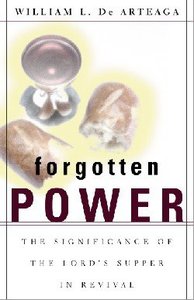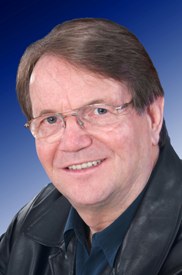Forgotten Power: The Lord’s Supper and the Biblical Pattern of Revival
Editor Note: The editors of the Pneuma Review are aware that Dr. De Arteaga’s views on sacraments will not be universally received among our readers. This guest essay is printed to encourage thought and discussion. Please add your comments below to join the conversation.
Revivals without the Lord’s Supper
 As we have seen,* by the time Charles Finney began his revival ministry in the 1820s, the model of the Word and the Lord’s Supper as a vehicle for revival began to diminish. With the revival ministry of Dwight Moody (1837–1899), Finney’s innovation of revivals without the traditional sacraments was solidified as the evangelical pattern. Since then no major evangelist has incorporated the Lord’s Supper as part of the revival cycle—although a few have urged immediate baptism after the conversion experience.
As we have seen,* by the time Charles Finney began his revival ministry in the 1820s, the model of the Word and the Lord’s Supper as a vehicle for revival began to diminish. With the revival ministry of Dwight Moody (1837–1899), Finney’s innovation of revivals without the traditional sacraments was solidified as the evangelical pattern. Since then no major evangelist has incorporated the Lord’s Supper as part of the revival cycle—although a few have urged immediate baptism after the conversion experience.
Was the elimination of the Lord’s Supper and its replacement with the altar call a Spirit-inspired development, or was it an unfortunate mistake? The noted Christian historian Iain Murray has recently said a loud Yes to the second question in a thoughtful and provocative book, Revival and Revivalism: The Making and Marring of American Evangelicalism.1 Murray argues that evangelicals should return to the revival methods that stressed prayer and personal repentance rather than the emotionalism of an altar call. We have pointed out how the abuse of the altar call, especially when combined with the doctrine of eternal assurance, has contributed to the blight of American antinomianism (ch. 2*).
* This is chapter 13, “Reflections on the Biblical Pattern of Revival” taken from FORGOTTEN POWER, THE by William L. De Arteaga. Copyright © 2002 by William L. De Arteaga. Used by permission of Zondervan. Read the review.
In truth, contemporary evangelists such as Billy Graham and Reinhard Bonnke have, in sheer numbers of conversions, outpaced all of the traditional sacramental revivals of history. It is hard to see how, for instance, the current Bonnke revivals in Africa could accommodate any sort of communion service. In a recent revival campaign in Benin, West Africa, the Rev. Bonnke and his ministry team attracted 640,000 persons during their six-day campaign and received 200,000 responses for salvation. The ministry team was overwhelmed by that response, as they had brought only 120,000 copies of their discipleship booklet, Now That You Are Saved. Thankfully they coordinated with the area Christian churches to assure that those who made a decision for Christ were channeled into active fellowships.2
To criticize that many of the persons who make the altar call at such events eventually backslide is to miss the point that many others do in fact become mature Christians. The current rapid expansion of Christianity in the Third World would not have been possible without the new sacramental form of the altar call. Further, most mature evangelists, such as Graham or Bonnke, go to great lengths to cooperate with local churches to assure that the convert’s discipling follows the altar call.
Don’t criticize people that respond to altar calls at mass evangelism events because some of them will backslide, many do become mature Christians.

Reinhard Bonnke preaching at the 2005 Crusade in Jos, Nigeria.
If Christianity were ruled by statistical analysis, we might indeed conclude that such is the case and indeed declare the altar call the new sacrament of evangelization—end of argument. However, Christians must always look back to the biblical evidence as a “reality check” and affirmation of current practice. In fact, both the Old and New Testament revivals have a strong sacramental component that is too often overlooked by modern readers, who look at the biblical data through contemporary, nonsacramental categories. Looking carefully at the biblical witness will help locate the divine plan for the role of the Lord’s Supper in revivals.
Category: Church History, Summer 2003



